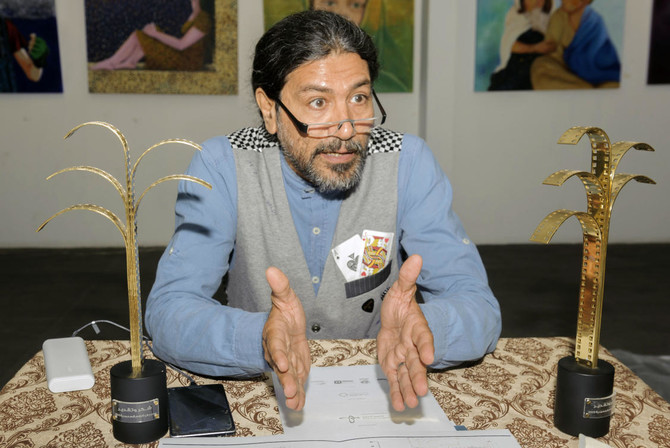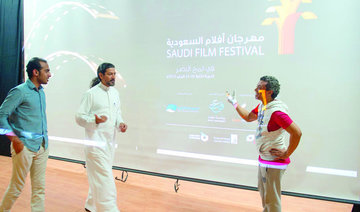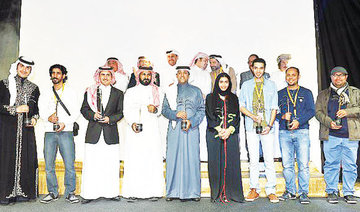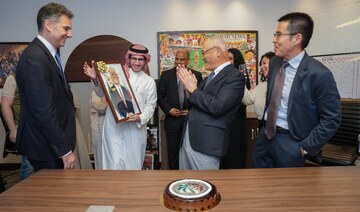RIYADH: The head of the main film festival in Saudi Arabia, where cinemas are banned, wants the government to invest in the sector as part of its campaign to encourage entertainment.
Ahmed AlMulla made the comments in an interview with AFP ahead of the fourth Saudi Film Festival, which runs from March 23-28 in the Gulf coastal city of Dhahran.
This year’s festival is the first since the kingdom late last year began a cautious push to introduce entertainment, despite opposition from conservative groups.
Among the events on offer for Saudi spectators have been the New York theatrical group iLuminate, the Comic-Con pop culture festival, and WWE wrestling.
“It’s nice to see all kinds of events here and people coming from outside,” AlMulla said.
But local talent needs to be trained, with support from the government, he said in a telephone interview.
“I think they must” fund it, he said, “because this is investment, the real investment.”
Among directors of the 59 Saudi films to be screened at this year’s festival are some who trained overseas, he said.
Saudi Arabia has created a government agency to support private firms organizing entertainment events, under a wideranging “Vision 2030” plan for economic and social reform.
The plan also calls for development of an arts and media industry, but with public theaters and cinemas banned, the sector is starting from a low base.
“We are waiting for the change, really. We want to create it from inside, not hosting events only,” AlMulla said.
“We have lots of talent working underground and nobody knows about them.”
Despite the annual film festival, Saudi Arabia lacks a film industry although female students can study filmmaking at a women’s university in Jeddah.
Saudi films have also won international recognition.
The romantic comedy “Barakah Meets Barakah” by Mahmoud Sabbagh was screened at last year’s Berlinale, and in 2013 Haifaa Al-Mansour’s “Wadjda” became the first Saudi film listed as a candidate for a foreign-language Oscar.
Saudis are voracious consumers of online videos and rank among the world’s top viewers of YouTube.
Private film screenings are also held in the kingdom, but Saudi Arabia’s highest-ranking cleric warned in January of the “depravity” of cinemas and music concerts.
This is the third consecutive annual film festival after it resumed in 2015 following an absence of seven years.
The event is organized by Dammam’s Society of Culture and Arts, and last year went ahead with permission from the local government.
AlMulla says this year’s festival will be bigger than ever, even though he laughs off a question about how it will be financed.
“We’ll arrange for that,” he says, adding that some sponsors have been found.
The festival moves this year from cramped quarters at the arts society to larger grounds near a new cultural center run by Saudi state oil giant Aramco.
The indoor and outdoor screening areas can hold almost 2,000 people.
Aside from the new venue, this year’s festival will feature a “production market” where filmmakers can meet with local production houses “to make deals,” AlMulla said.
The festival is also increasing its public education effort.
Students will be brought in to watch children’s films, local and international experts will hold panel discussions, and the festival is to issue a book on late Japanese filmmaker Akira Kurosawa.
The number of films and scripts vying for competition has increased but fewer applicants were accepted for screening in an effort to raise quality, AlMulla said.
The festival opens with a drama that resonates as the kingdom’s efforts to expand entertainment face resistance from conservatives.
“Wasati” directed by Ali Alkalthami is based on the true story of extremists trying to disrupt a play at a university theater in Riyadh 10 years ago.
Saudi film fest head says cinema needs state funding
Saudi film fest head says cinema needs state funding

Busy bees: Asir’s local markets abuzz over Sidr honey season

- Unique taste, aroma make it popular locally, internationally
RIYADH: The Asir region is currently in the midst of the Sidr honey season, with local markets flooded with high-quality honey produced from the nectar of Sidr trees.
The recent heavy rainfall in the region has led to a prolific flowering of Sidr trees, providing ideal conditions for bees to produce abundant and flavorful honey, the Saudi Press Agency reported.
Sidr honey, which is renowned for its health benefits, is particularly prized for its antioxidant properties and ability to strengthen the immune system.
The unique taste and aroma of the honey have made it a sought-after commodity, both locally and internationally, the SPA reported.
Beekeepers in Tihama Asir have been busy harvesting the golden nectar, with prices ranging from SR350 to SR500 ($93-133) per kg.
The region’s diverse ecosystem, characterized by its fertile valleys and abundant flora, provides an optimal environment for beekeeping.
The Ministry of Environment, Water and Agriculture is actively supporting the development of the beekeeping industry. Initiatives such as the beekeeping and honey production development initiative improve practices, protect bee populations, and enhance the quality of honey.
By promoting sustainable beekeeping and preserving the natural habitats of bees, the Kingdom seeks to strengthen its position as a leading producer of high-quality honey while contributing to the global market.
Saudi Reef Forum to focus on rural sustainability

- Al-Ahsa event to promote communities’ role in economic growth
RIYADH: The Ministry of Environment, Water and Agriculture will host the 1st International Forum for Saudi Reef in Al-Ahsa from Dec. 16-18, aiming to strengthen rural communities, and promote their role in driving sustainable development.
Maha Aldhahi, head of the forum’s executive committee, said: “The forum is pivotal in advancing rural development, aligning with the UN Sustainable Development Goals and Saudi Vision 2030. It will support rural communities, while contributing to global efforts and research on sustainable agriculture.”
Aldhahi said that the forum will unite regional and international experts to address the challenge of rural-to-urban migration, a widespread issue. To counter this, the forum will propose practical solutions to ensure rural areas remain economically viable, vibrant, and sustainable.
Additionally, it will explore innovations in agriculture and rural development, fostering economic growth and social cohesion through job creation and investment promotion, she added.
Aldhahi said that the forum builds on the Saudi Reef Program, recognized by the UN Food and Agriculture Organization as the world’s largest development initiative of its kind.
The program has supported over 77,000 agricultural projects, achieved a self-sufficiency rate exceeding 65 percent in vital sectors, and provided upskilling and career opportunities for rural communities.
Ghassan Bakri, secretary-general of the Saudi Reef Program, said: “The program is a model of sustainable growth, addressing food security and job creation while preserving cultural heritage. By hosting this forum, we aim to attract global partnerships and exchange cutting-edge solutions for rural empowerment.”
Bakri added that the forum will feature dynamic discussions on key topics, including sustainable agricultural practices, rural entrepreneurship, and the role of modern technology in agriculture.
The three-day event will also include an exhibition showcasing unique rural practices, handicrafts, and the work of local farmers, artisans, and entrepreneurs. It will highlight how traditional techniques integrate with modern innovations to create sustainable livelihoods.
Saudi Arabia arrests 19,696 illegals in one week

- A total of 11,336 people were arrested for violations of residency laws
RIYADH: Saudi authorities arrested 19,696 people in one week for breaching residency, work and border security regulations, the Saudi Press Agency reported on Saturday.
According to an official report, a total of 11,336 people were arrested for violations of residency laws, while 5,176 were held over illegal border crossing attempts, and a further 3,184 for labor-related issues.
The report showed that among the 1,547 people arrested for trying to enter the Kingdom illegally, 65 percent were Ethiopian, 32 percent Yemeni, and 3 percent were of other nationalities.
A further 71 people were caught trying to cross into neighboring countries, and 22 were held for involvement in transporting and harboring violators.
The Ministry of Interior said that anyone found to be facilitating illegal entry to the Kingdom, including providing transportation and shelter, could face imprisonment for a maximum of 15 years, a fine of up to SR1 million ($260,000), as well as confiscation of vehicles and property.
Suspected violations can be reported on the toll-free number 911 in the Makkah and Riyadh regions, and 999 or 996 in other regions of the Kingdom.
Gaza victims praise Saudi Arabia’s lifesaving humanitarian efforts

Riyadh: Palestinians in Gaza who received Saudi aid have expressed gratitude to the Kingdom for its humanitarian support through aid agency KSrelief.
They likened the Saudi assistance to rain that quenches their thirst for hope, alleviates suffering and rekindles optimism amid immense challenges, the Saudi Press Agency reported.
Samaher Eid Awkal, 47, said she struggled with health issues while living in Khan Younis with her blind mother in a basic tent. She thanked KSrelief for providing her family with a suitable tent, which has eased their hardship and restored hope.
A Gaza mother who endured freezing conditions with her children without shelter also expressed appreciation after receiving essential aid. She described the support as a source of joy and hope during difficult times.
Mahmoud Nabil Abu Alwan, displaced from Rafah to Mawasi in Khan Younis, thanked KSrelief after he received a new tent. He previously lived in a dilapidated tent borrowed from relatives amid shelling and harsh displacement conditions.
Saudi Orchestra performance in Tokyo helps ‘bridge cultural boundaries,’ CEO says

TOKYO: The Saudi National Orchestra’s performance in Tokyo is “bridging cultural boundaries” as part of Vision 2030, the CEO of the Kingdom’s top music body has said.
Paul Pacifico, CEO of the Saudi Music Commission, added that music has a “very important part to play in each of the three main pillars of Vision 2030” as it represents a proud nation, a vibrant society and diversified economy.
Bringing the Saudi National Orchestra to Tokyo has given people the opportunity “to communicate with our language and it allows everybody to come together and share an experience that allows us to appreciate each other’s cultures, and really to be in harmony,” Pacifico said.
“And that’s why I think it’s so special that the orchestra is here for the first time.”
The program for the performance last night included traditional music directed by Saudi director Reab Ahmed, as well as the Japanese Imperial Court Orchestra “Gagaku.”
Pacifico said: “We’re able to show Saudi culture on one of the most prestigious stages in one of the world’s great cultural capitals here at Tokyo Opera City, and we’re doing that with authentic Saudi music, and authentic traditional Japanese music with Gagaku.
“But also with that great fusion between the two sets of musicians coming together and doing something really unique and beautiful.
“The Saudi National Orchestra and choir is really at the vanguard of developing the music landscape in Saudi Arabia as it builds the depth and richness and uniqueness of its beautiful culture, both traditional and modern.”
Pacifico said it was “an honor” to share the stage with the Japanese Imperial Orchestra performers. “It also shows how our cultures are different and yet similar: The regard for tradition and modernity, the appreciation of music, the sense of formality in public, but warmth and a sense of fun as well in private.”
He hoped that Friday’s performance was not a one-off but the foundation of a rich and longstanding collaboration with “our Japanese friends, the Tokyo College of Music, who we’re collaborating with on this concert.
“We hope that Saudi artists will start to have opportunities to play on stages here in Tokyo, like the Blue Note and Billboard Live and the Cotton Club, or festivals like Summer Sonic or Fuji Rock. And equally, we’d love to see Japanese artists playing more in Riyadh and all over the Kingdom of Saudi Arabia.
“Saudi Arabia has a very exciting story to tell.”

























